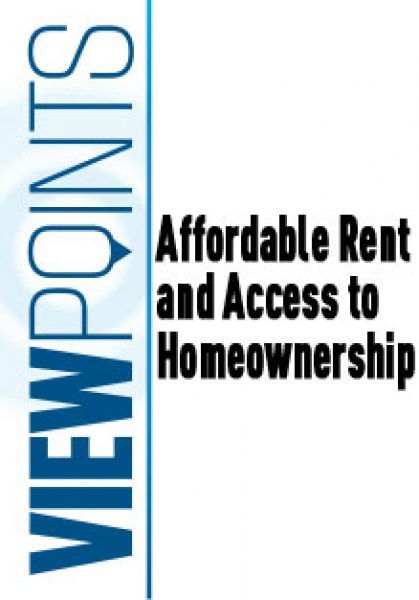
Affordable Rent and Access to Homeownership: Refreshing the Debate in the Context of Housing Finance Reform
The continuing policy debate over restructuring the plumbing of the secondary mortgage market may ultimately prove to be the easy part—at least politically—of housing finance reform. The past eight years of proposals and counterproposals have focused the range of outcomes increasingly within a fairly narrow band—more private capital, a mortgage-backed security (MBS) explicitly guaranteed by the government, the elimination of the government-sponsored enterprise (GSE) duopoly, and flawed ownership model all being consistent themes. The proposal we put forward last year favored leveraging a single government MBS—the Ginnie Mae security—coupled with a well-regulated and competitive market for credit enhancement.
Arguably, though, the more important part of reform—the part still in need of fresh thinking—is whether and how to produce broader and more sustainable access to credit for first-time home buyers and low- and moderate-income Americans as well as how to increase the supply of housing with affordable rent. In this paper, we analyze more deeply the discussion around access and affordable rent.
Our key conclusions and recommendations may be briefly summarized as follows:
- The rental market in America today is frequently inhibited by local land use, zoning, and building restrictions that, while well-intentioned, can impede the creation of affordable rent.
- In multifamily finance, we recommend keeping in place much of the loss-sharing arrangements used by Fannie Mae and Freddie Mac in their K-Series and DUS programs , but we suggest separating Fannie and Freddie’s multifamily units into independently owned and operated private companies separate from their single-family business units.
- Turning to single-family housing, for those who believe that there are good loans that are not being made—a proposition for which there is some evidence—our view is that more competition and innovation in underwriting is critical to solving this challenge.
- A reformed secondary mortgage market should encourage lending to all income levels and communities.
- To augment this “duty to serve,” we propose a simple, transparent, and accountable fee on all borrowers benefiting from access to a government-backed securitization process.
- The Federal Housing Administration (FHA) should be modernized, starting with a restatement of its mission and purpose.
- As long as we are going to have subsidies and public policy designed to help low-income families or communities on the margin to buy homes, we must recognize that what counts is not simply how many loans are made, but whether the loans are successful.
- The single-family market needs to focus more on preparing renters to be successful homeowners.
